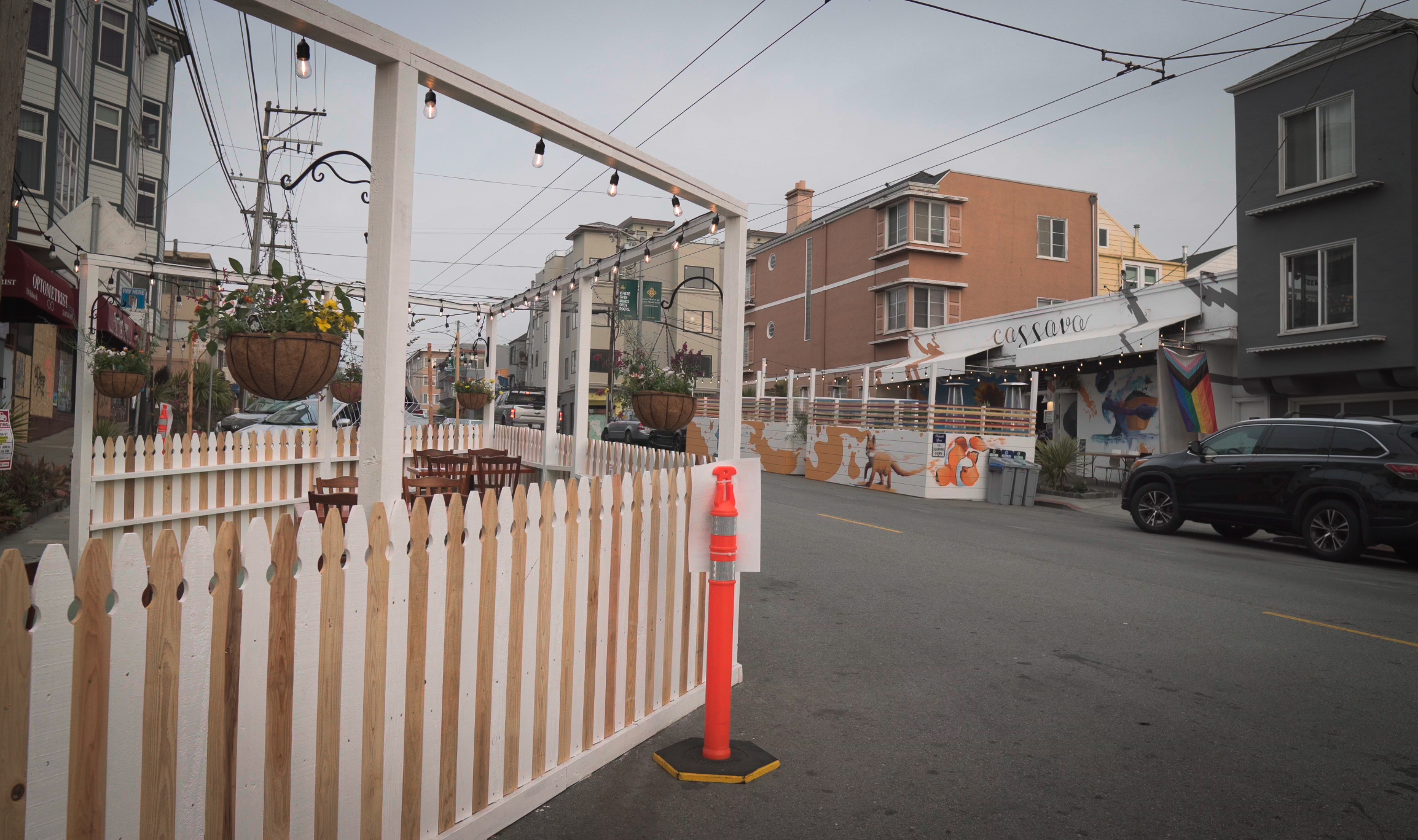A program often described as a “lifeline” for beleaguered San Francisco businesses, and one of few silver linings to emerge from the pandemic, was delayed by a Board of Supervisors committee pending further input.
At a meeting of the Board’s Land Use Committee on Monday, Supervisors punted a decision on whether to indefinitely extend Shared Spaces, a program that allows small businesses to expand onto sidewalks, parking spaces or other outdoor spots. In a unanimous decision, Supervisors Aaron Peskin, Myrna Melgar and Dean Preston voted to reassess the proposal in two weeks’ time.
“I think we have a lot of time to get this right,” said Peskin at the nearly five-hour hearing. At the same meeting, the Supervisors also delayed a vote on the Small Business Recovery Act, a proposal by Mayor London Breed to simplify the permitting process for new businesses.
The Shared Spaces legislation would make the program permanent, with applications and approvals jointly managed by the Planning Department, Department of Public Works, Municipal Transportation Agency, Fire Department and Entertainment Commission. Among other provisions, the program requires the creation of a “one-stop” portal whereby business owners can apply and receive approval within 30 days.
The Shared Spaces program was introduced last year as an emergency measure for restaurants, and the outdoor dining areas have been embraced by many residents and proprietors. 2,500 businesses have applied for Shared Spaces permits, according to SFMTA, of which 1,900 have been approved so far.
In an economic impact report, the San Francisco Controller’s Office determined that businesses with parklets grew their quarterly revenues by 29%, or $56,000 on average, compared to 10% revenue growth among similar businesses that did not install a parket. The assessment used parklets, a more limited outdoor dining program that has existed in the City for years, as an analog for Shared Spaces, and analyzed sales tax receipts for participating businesses.
“It does suggest a broader benefit to the city’s economy,” said Ted Egan, San Francisco’s chief economist.
Supervisor Peskin, who initially described himself as a “large proponent” of the Shared Spaces effort, voiced a number of concerns at Monday’s meeting, ranging from the timing of the economic impact report to the lack of granular information on the expected losses from metered parking spaces that may be sacrificed to the program.
SFMTA estimated that it could lose $10.6 million annually in parking meter revenue, though Director Jeffrey Tumlin argued in favor of Shared Spaces at a meeting earlier this month. “Compensatory financial factors,” namely increased sales tax revenue, would make the program a boon for the agency, according to Tumlin.
During public comment, bar and restaurant owners urged the board to approve the indefinite extension without delay. Several described accruing hundreds of thousands of dollars in debt since last March, saying that they urgently need clarity on the status of Shared Spaces.
“We cannot spend one more dollar until we know if our city supports this,” said Debbie Miller, owner of the Royal Cuckoo. “This delay is affecting a lot of our friends—servers, bartenders, musicians—who need work.”
Restaurant and bar closures accounted for tens of thousands of lost jobs in San Francisco during the pandemic, and commercial tenants accrued $404 million in unpaid rent between April 2020 and December 2020, according to a recent analysis. Retail businesses, chiefly bars and restaurants, accounted for as much as 98% of that unpaid rent.
“Shares Spaces has been critical for rehiring; for every 20 seats, that equates to hiring one or two employees,” said Laurie Thomas, executive director of the Golden Gate Restaurant Association. “Putting it off now will only discriminate against restaurants who have not been able to access the program yet.”
Critics of the proposal included advocates for seniors and people with disabilities who remain wary of the limitations on sidewalk space. Opponents also voiced concerns about the privatization of public spaces.
“This city, and frankly all cities, have a history of making changes that help one group but hurt other groups,” said Cathy Deluca of Community Living Campaign, an organization serving seniors and people with disabilities.
Green-lighting the program doesn’t preclude further changes should issues and complaints arise, according to proponents. The legislation, as written, gives the Department of Public Works authority to write additional regulations on maintenance, compliance with the Americans with Disabilities Act, and other concerns.
“We need to get out of our own way,” said Supervisor Ahsha Safai, who co-sponsored the legislation along with Mayor London Breed and Supervisors Rafael Mandelman,. Catherine Stefani, and Matt Haney.
Voting to delay the measure, Peskin and Preston asked for further input on a number of topics such as the total number of expected Shared Spaces, their potential valuations and the merits of commercial Shared Spaces versus parklets that are deemed entirely public space.
Both the Shared Spaces and Business Recovery Act legislation will be discussed again on June 7.
